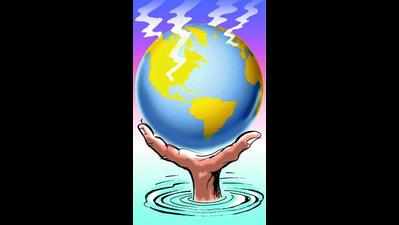- News
- City News
- chennai News
- 'Rising green offences due to poor implementation of rules'
Trending
This story is from October 23, 2016
'Rising green offences due to poor implementation of rules'
Speakers at a regional conference on environment here on Saturday found no unanimous answers, but agreed that the onus was largely on the executive to enforce environment laws.

Representative image
CHENNAI: Who is responsible for ineffectiveness of environmental laws?
Speakers at a regional conference on environment here on Saturday found no unanimous answers, but agreed that the onus was largely on the executive to enforce environment laws. The Tamil Nadu Pollution Control Board, empowered to crack down on offenders, however, cited lack of sufficient resources to do so.
Justice N V Ramana, Supreme Court judge, said there was judicial activism or overreach because of non-deliverance on the part of the executive. Justice R Banumathi of the Supreme Court, recalling a 2005 incident where she found waste being discharged by a lorry into a water body in Madurai, said she struggled to contact the pollution control board to register a complaint. "When the situation was such with a (former) high court judge, think about the common man." There was no dearth of rules, but the problem was implementation, she said.
Highlighting the provisions of biomedical waste management rules, 2016, Madras high court judge M M Sundresh said hospitals both treat and create diseases. According to the rules, the TNPCB could authorise as well as cancel/suspend licences along with initiating criminal proceedings against hospitals for contravening rules. "Despite provisions under the Environment Protection Act, statistics show practically nothing like cases being registered," he said.
Balakrishna Pisupati, director of UNEP, P S Rao, expert member of NGT, southern zone and Justice Swatanter Kumar, chairperson of NGT were also present.
Speakers at a regional conference on environment here on Saturday found no unanimous answers, but agreed that the onus was largely on the executive to enforce environment laws. The Tamil Nadu Pollution Control Board, empowered to crack down on offenders, however, cited lack of sufficient resources to do so.
Justice N V Ramana, Supreme Court judge, said there was judicial activism or overreach because of non-deliverance on the part of the executive. Justice R Banumathi of the Supreme Court, recalling a 2005 incident where she found waste being discharged by a lorry into a water body in Madurai, said she struggled to contact the pollution control board to register a complaint. "When the situation was such with a (former) high court judge, think about the common man." There was no dearth of rules, but the problem was implementation, she said.
Highlighting the provisions of biomedical waste management rules, 2016, Madras high court judge M M Sundresh said hospitals both treat and create diseases. According to the rules, the TNPCB could authorise as well as cancel/suspend licences along with initiating criminal proceedings against hospitals for contravening rules. "Despite provisions under the Environment Protection Act, statistics show practically nothing like cases being registered," he said.
Pointing to a "mammoth problem", TNPCB chairman Atulya Misra said Tamil Nadu comprised 4% of India's geographical area and had 6% of its population, but generated 10% of its solid waste. There were just 300 people in the field who had to manage all activities of the board. There were also around 200 vacancies in the board along with a large number of people being trained.
Balakrishna Pisupati, director of UNEP, P S Rao, expert member of NGT, southern zone and Justice Swatanter Kumar, chairperson of NGT were also present.
End of Article
FOLLOW US ON SOCIAL MEDIA










